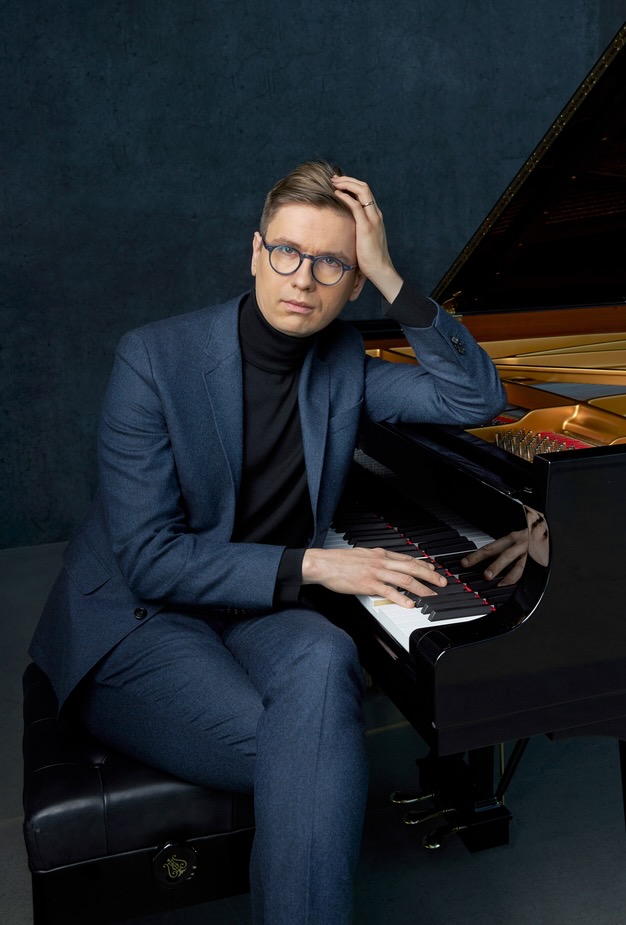Ólafsson delivers a Bach night to remember for the Celebrity Series

“Not every concert,” Erich Leinsdorf once quipped, “needs to be a spiritual experience.”
Some, however, veer more naturally in that direction than others. Víkingur Ólafsson’s Boston recital on Saturday night was one of them.
The Icelandic pianist, who was making his second appearance on the Celebrity Series and first at Jordan Hall, raised expectations early, requesting that there be no late seating for his sold-out, intermission-less traversal of Johann Sebastian Bach’s Goldberg Variations. Accordingly, the venue was packed within minutes of 8 o’clock.
Perhaps as a result, the audience was on its best behavior: for one of the few times this season, there were no inopportune ringtones or forgotten alarms interfering with the night’s proceedings. What’s more, the crowd’s intense, palpable concentration matched the attention Ólafsson lavished on his lone offering.
Bach’s late masterpiece is not for the faint of heart, either performers or hearers. Its thirty variations on a deceptively simple Aria contain multitudes of expressive, thematic, and textural contrasts as well as extraordinary technical demands.
Among them, the variations’ relative tonal stasis and focus on a repeated series of chord progressions can, for good or ill, lend it a hypnotic quality. The score’s singular structure—ten sets of three variations, the last of which is a canon at a different interval—requires an interpreter whose grasp of the music’s architecture is equal to their comprehension of the work’s enormous expressive goals.
Conveying all of this across nearly eighty minutes requires prodigious mental as well as physical stamina. On Saturday, though, Ólafsson’s artistry was fully up to the Goldbergs’ exigencies and then some.
His account, with its sweeping sense of character and sheer rhythmic verve, guaranteed that nothing sounded complacent. At the same time, Ólafsson’s total identification with the music ensured that the larger work moved and breathed with a naturalness that felt utterly right.
The Aria statements were enchanting: floating, soulful, faultlessly voiced. So were the pivotal slow variations. Number 13 danced with exquisite poise, while No. 15’s pungent chromatic turns soared. Meantime, the epochal Adagio (No. 25) unfolded with breathtaking spaciousness and pristine clarity.
Equally captivating was Ólafsson’s way through the livelier sections. Variation 4 exhibited endearing dynamic shapeliness while the gigue rhythms in No. 7 snapped. The Fughetta (No. 10) proved invigoratingly limber, as did No. 14’s swaggering volleys.
Gripping, too, was Ólafsson’s way with the spirited runs that dot several variations in the Goldberg’s second half. In these, the pianist often seemed to be reveling in the near-orchestral tonal range of his Steinway. Yet there was a clearly dramatic purpose for his approach, as the burst of colors that reinforced the feeling of emotional release in Variation 26 made clear.
Likewise revealing were Ólafsson’s phrasings. He never duplicated any of the variations exactly: each of the repeated 16-bar statements boasted their own shape, shadings, and embellishments. So focused was his reading that even the freewheeling blaze of hockets in No. 29 seemed to emerge, each time around, from a slightly different angle.
The cumulative result was a performance of titanic musicianship that gave one a new appreciation for Bach’s stated intent for the Variations. On the title page of the original 1741 edition, the composer wrote that the score was “composed for music-lovers, to refresh their spirits.” Rarely in recent memory—and in any opus—has that epigraph been better or more fully realized than in Saturday’s Goldberg performance
The Celebrity Series presents the Takács Quartet playing music by Haydn, Ngwenyama, and Beethoven 8 p.m. Friday at Jordan Hall. celebrityseries.org